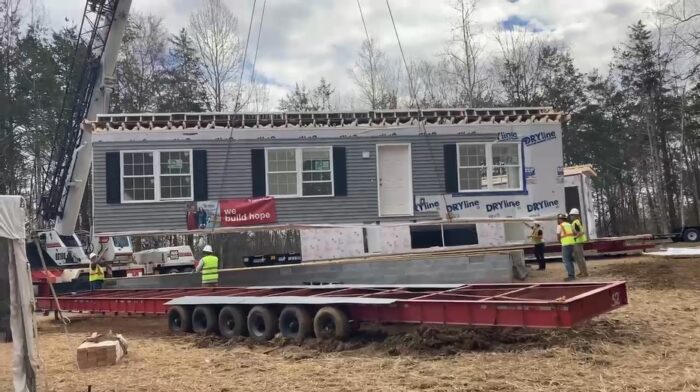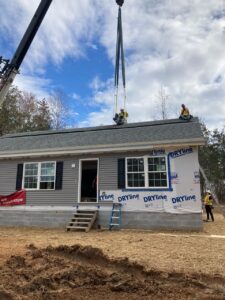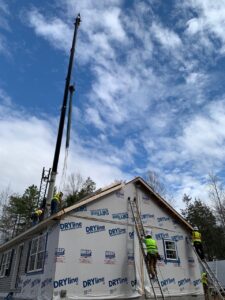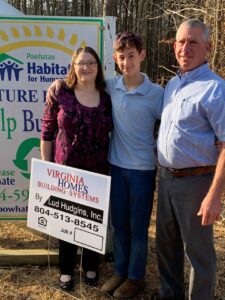
A crane placed the modular home on its foundation in late February. (Images courtesy Susan Winiecki)
To provide its latest home for a family in need, an area housing nonprofit took a different approach that it believes is the first of its kind among its regional peers.
Habitat for Humanity–Powhatan recently provided a mother and son with its first modular home, marking what Executive Director Susan Winiecki described as a new approach for Habitat affiliates in the region to provide lower-income families with housing.
Also known as prefabricated or factory-built homes, modular homes are a type of manufactured home that are mostly built in sections off-site and then delivered and assembled. The home is placed on a foundation using a crane, as was the case with the Powhatan house, which was installed along Old Tavern Road late last month.
Winiecki said she learned about the modular approach from the Habitat affiliate in Staunton, which had found it provided efficiencies and economies of scale. She said the housing type proved to be a good fit for her affiliate, which averages about two home builds a year.
“We are a relatively small affiliate, we don’t have a full-time construction manager, so a build takes a lot of people and planning,” Winiecki said. “I really was liking what I was hearing and brought it forth to our board last year.
“It allows us to order a house – it takes four months – but it allows us to put it up in two months, which is incredible,” she said. “It allows us to set a price and know what that price is, and it allows us to choose how much we want to do on the house or not. We can make all those decisions upfront.”
Built by Virginia Homes Building Systems, a division of Pennsylvania-based Modular Building Systems of PA, the Old Tavern Road house totals 1,200 square feet with three bedrooms and two bathrooms. Winiecki said the house cost just under $200,000 to build, funded in part by a regional grant from Virginia Housing.
“To get a house at 1,200 square feet built under $200,000 will be a great success,” Winiecki said.
The $3 million grant was awarded to PlanRVA, which worked with the regional Partnership for Housing Affordability to distribute the funds to area housing nonprofits, Winiecki said. Additional support for the house came locally from Envestnet MoneyGuide, Wells Fargo, Reed and Gail Schweickert, Luck Stone, Yard Works and other donors.
The house was installed by Lud Hudgins Inc., a modular homes builder based in Moseley doing business as Hudgins Homes. Winiecki said finding the local firm was integral to pulling off the project.
“We interviewed a builder who’s been working with modulars for 30 years, which is pretty comforting in that regard,” she said. “We felt like we’re in good hands, and Tyler Hudgins knows that this is our first and has been terrific to work with.”
While manufactured homes are increasing in popularity as an option for providing lower-income housing (the City of Richmond’s proposed budget includes $500,000 to create a program for providing alternative homeownership options such as manufactured homes), modular homes have yet to catch on in Central Virginia, said Lee Householder, CEO of Richmond nonprofit Project:Homes.
Even though the nonprofit has provided about five modular homes (of 260 it’s built in the region), Householder said transportation costs and challenges in sourcing have made them less feasible in Richmond’s urban core, though he does consider them conducive to rural areas and locations where they can be built in clusters.
“We think it’s a necessary part in the future of affordable housing; it just hasn’t arrived yet, in my opinion,” Householder said. “You certainly get time and convenience, and I feel that modular is a strong form of construction. But really, at scale is where it has its best benefits.
“What we’ve found is if you want to match neighborhood character, like in urban neighborhoods, you do have to do some sitework, and that extra bit of sitework really dissolves the affordability quotient. You lose the upside. Plus, urban areas are tight, so they’re a better solution right now” in rural areas, he said.
Winiecki said modular homebuilding is on the rise across the state, citing Department of Housing and Community Development data showing a 24 percent rise in building registration seal approvals 2020 to 2021. She said studies have also shown that project timelines with modular builds can be reduced 20 to 50 percent compared to stick-builds.
Winiecki said Habitat–Powhatan plans to provide another modular home later this year and potentially a third heading into next year. She emphasized the approach would not replace the volunteers that are synonymous with Habitats across the country.
“We’re not leaving volunteers behind,” she said. “The Habitat model is based on community involvement and volunteer involvement, and it’s a wonderful thing to see the actual partner family, who does get a mortgage, work with volunteers on site. That will still happen.”
She noted that volunteers were needed to finish off the home with construction of a porch, deck and interior finishes overseen by Powhatan-based Benchmark Construction of Virginia.
“All of those things will still go on. We’re just ahead of the game a few months by the time we walk in the door with volunteers,” she said.
Winiecki said the mortgage is made affordable to the homeowner by making sure it’s no more than 30 percent of the household’s gross income, which typically ranges from $30,000 a year to 60 percent of the area median income. She said Habitat-Powhatan takes on a “silent” second mortgage to make up the difference of the home’s appraised value.
The family who received the Old Tavern Road house, Nicole Chrimes and son Aiden, had put in a lot of hours at Habitat–Powhatan’s ReStore off Route 60, said Winiecki, a former longtime editor and publisher with Richmond Magazine who joined Habitat–Powhatan in mid-2020 after serving six years on the board of Richmond Metropolitan Habitat for Humanity.
“I just fell head over heels with the whole process of getting folks into homes and repairing homes and knowing the need,” she said. “All the skills over the years, of writing and storytelling and covering the region and knowing the issues, all played into this beautifully.”
In addition to the 15 homes it’s built since it started in 2001, Habitat–Powhatan also performs home repairs, completing over 100 since 2020, according to its website. The nonprofit is headquartered at its ReStore at 1922 Urbine Road.
Correction: The project involved Powhatan-based Benchmark Construction of Virginia. A similarly named firm in Glen Allen was previously mentioned in the story.

A crane placed the modular home on its foundation in late February. (Images courtesy Susan Winiecki)
To provide its latest home for a family in need, an area housing nonprofit took a different approach that it believes is the first of its kind among its regional peers.
Habitat for Humanity–Powhatan recently provided a mother and son with its first modular home, marking what Executive Director Susan Winiecki described as a new approach for Habitat affiliates in the region to provide lower-income families with housing.
Also known as prefabricated or factory-built homes, modular homes are a type of manufactured home that are mostly built in sections off-site and then delivered and assembled. The home is placed on a foundation using a crane, as was the case with the Powhatan house, which was installed along Old Tavern Road late last month.
Winiecki said she learned about the modular approach from the Habitat affiliate in Staunton, which had found it provided efficiencies and economies of scale. She said the housing type proved to be a good fit for her affiliate, which averages about two home builds a year.
“We are a relatively small affiliate, we don’t have a full-time construction manager, so a build takes a lot of people and planning,” Winiecki said. “I really was liking what I was hearing and brought it forth to our board last year.
“It allows us to order a house – it takes four months – but it allows us to put it up in two months, which is incredible,” she said. “It allows us to set a price and know what that price is, and it allows us to choose how much we want to do on the house or not. We can make all those decisions upfront.”
Built by Virginia Homes Building Systems, a division of Pennsylvania-based Modular Building Systems of PA, the Old Tavern Road house totals 1,200 square feet with three bedrooms and two bathrooms. Winiecki said the house cost just under $200,000 to build, funded in part by a regional grant from Virginia Housing.
“To get a house at 1,200 square feet built under $200,000 will be a great success,” Winiecki said.
The $3 million grant was awarded to PlanRVA, which worked with the regional Partnership for Housing Affordability to distribute the funds to area housing nonprofits, Winiecki said. Additional support for the house came locally from Envestnet MoneyGuide, Wells Fargo, Reed and Gail Schweickert, Luck Stone, Yard Works and other donors.
The house was installed by Lud Hudgins Inc., a modular homes builder based in Moseley doing business as Hudgins Homes. Winiecki said finding the local firm was integral to pulling off the project.
“We interviewed a builder who’s been working with modulars for 30 years, which is pretty comforting in that regard,” she said. “We felt like we’re in good hands, and Tyler Hudgins knows that this is our first and has been terrific to work with.”
While manufactured homes are increasing in popularity as an option for providing lower-income housing (the City of Richmond’s proposed budget includes $500,000 to create a program for providing alternative homeownership options such as manufactured homes), modular homes have yet to catch on in Central Virginia, said Lee Householder, CEO of Richmond nonprofit Project:Homes.
Even though the nonprofit has provided about five modular homes (of 260 it’s built in the region), Householder said transportation costs and challenges in sourcing have made them less feasible in Richmond’s urban core, though he does consider them conducive to rural areas and locations where they can be built in clusters.
“We think it’s a necessary part in the future of affordable housing; it just hasn’t arrived yet, in my opinion,” Householder said. “You certainly get time and convenience, and I feel that modular is a strong form of construction. But really, at scale is where it has its best benefits.
“What we’ve found is if you want to match neighborhood character, like in urban neighborhoods, you do have to do some sitework, and that extra bit of sitework really dissolves the affordability quotient. You lose the upside. Plus, urban areas are tight, so they’re a better solution right now” in rural areas, he said.
Winiecki said modular homebuilding is on the rise across the state, citing Department of Housing and Community Development data showing a 24 percent rise in building registration seal approvals 2020 to 2021. She said studies have also shown that project timelines with modular builds can be reduced 20 to 50 percent compared to stick-builds.
Winiecki said Habitat–Powhatan plans to provide another modular home later this year and potentially a third heading into next year. She emphasized the approach would not replace the volunteers that are synonymous with Habitats across the country.
“We’re not leaving volunteers behind,” she said. “The Habitat model is based on community involvement and volunteer involvement, and it’s a wonderful thing to see the actual partner family, who does get a mortgage, work with volunteers on site. That will still happen.”
She noted that volunteers were needed to finish off the home with construction of a porch, deck and interior finishes overseen by Powhatan-based Benchmark Construction of Virginia.
“All of those things will still go on. We’re just ahead of the game a few months by the time we walk in the door with volunteers,” she said.
Winiecki said the mortgage is made affordable to the homeowner by making sure it’s no more than 30 percent of the household’s gross income, which typically ranges from $30,000 a year to 60 percent of the area median income. She said Habitat-Powhatan takes on a “silent” second mortgage to make up the difference of the home’s appraised value.
The family who received the Old Tavern Road house, Nicole Chrimes and son Aiden, had put in a lot of hours at Habitat–Powhatan’s ReStore off Route 60, said Winiecki, a former longtime editor and publisher with Richmond Magazine who joined Habitat–Powhatan in mid-2020 after serving six years on the board of Richmond Metropolitan Habitat for Humanity.
“I just fell head over heels with the whole process of getting folks into homes and repairing homes and knowing the need,” she said. “All the skills over the years, of writing and storytelling and covering the region and knowing the issues, all played into this beautifully.”
In addition to the 15 homes it’s built since it started in 2001, Habitat–Powhatan also performs home repairs, completing over 100 since 2020, according to its website. The nonprofit is headquartered at its ReStore at 1922 Urbine Road.
Correction: The project involved Powhatan-based Benchmark Construction of Virginia. A similarly named firm in Glen Allen was previously mentioned in the story.







Manufactured and Modular homes are going to dominate the next 10 years. People are finally understanding it’s the solution to affordable housing. I wish Habitat would reach out to me. We get homes directly from the manufacturer in 3 weeks at $50/sf. We could add thousands of affordable homes to the area in no time. Unfortunately, the government and politicians have a strict NIMBY policy which is shutting out the middle class. We do the same thing at half the cost and much quicker than Habitat for Humanity, and we’re able to scale it. Habitat for Humanity is getting press… Read more »
Your website shows manufactured homes rather than modular or anything else. We need more houses built. Manufactured homes have a place in housing but they are not a substitute for building houses, whether they be on or off site built.